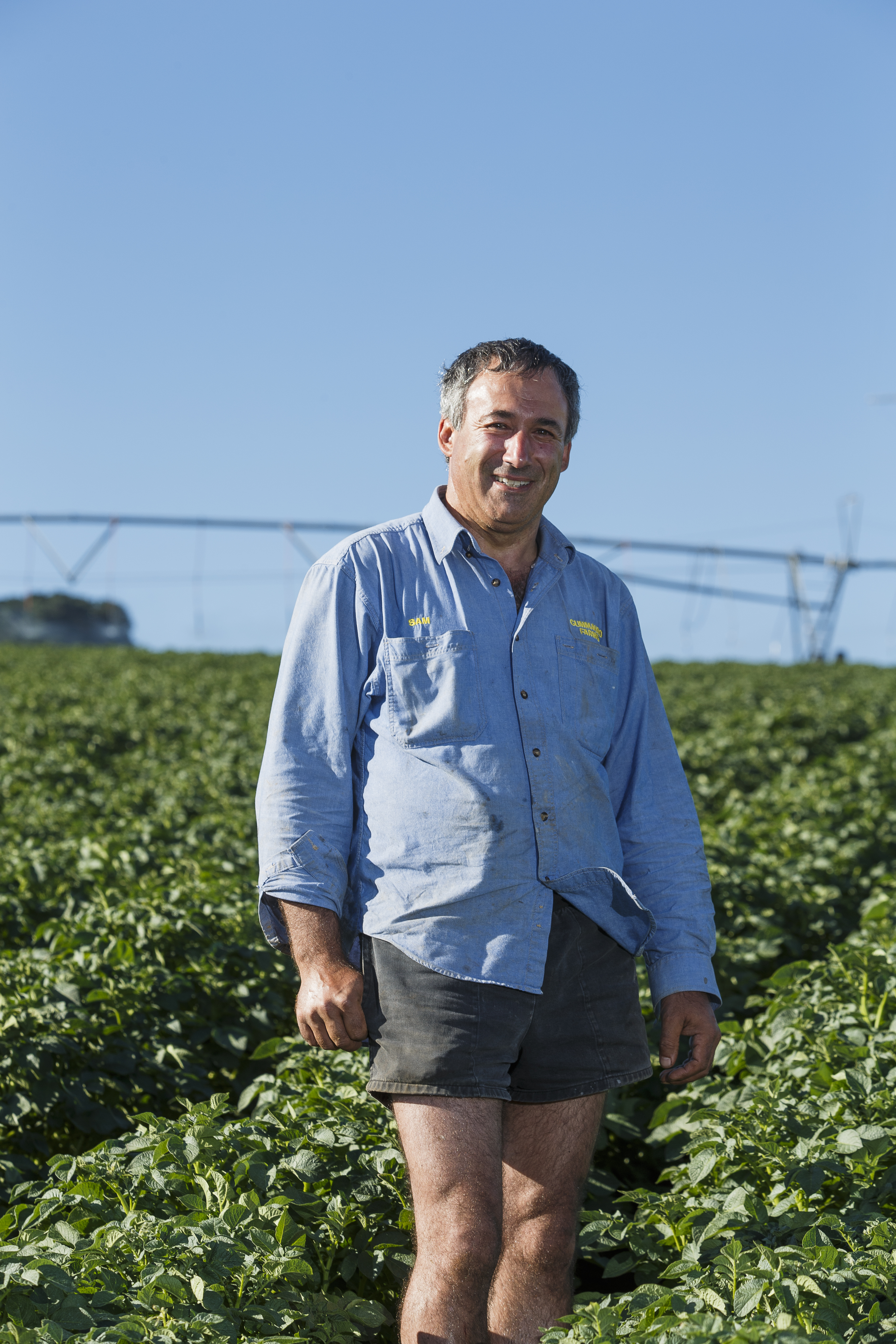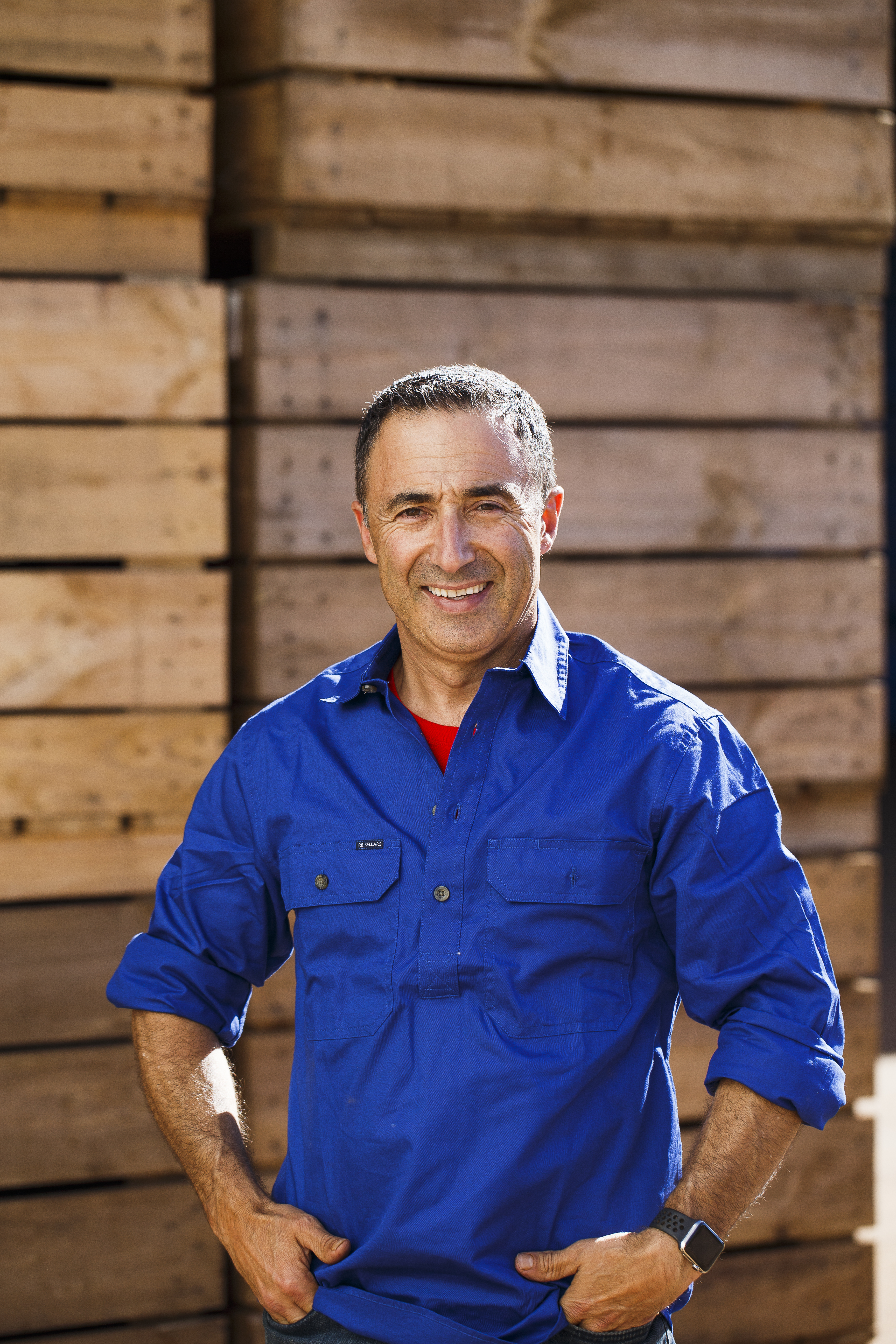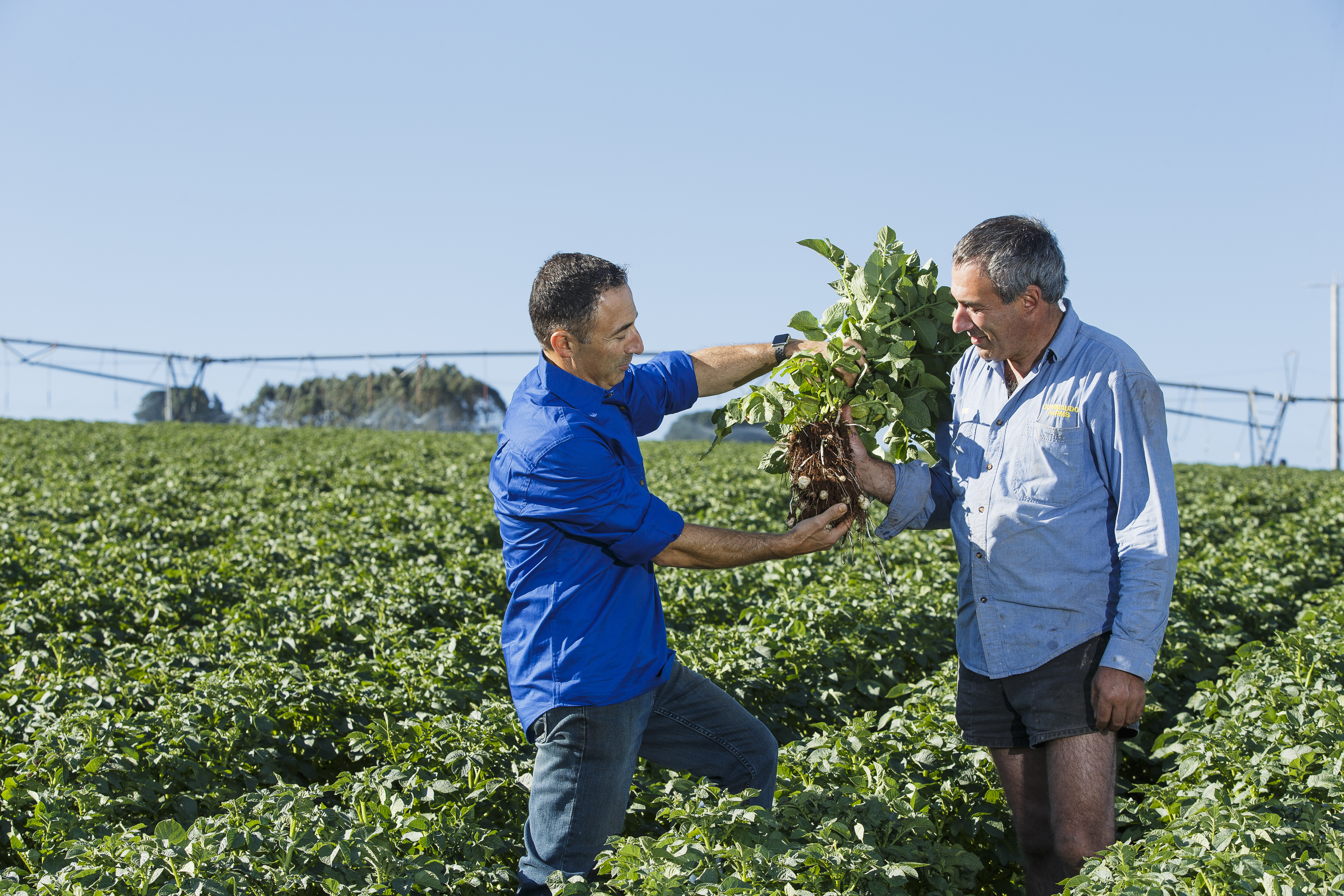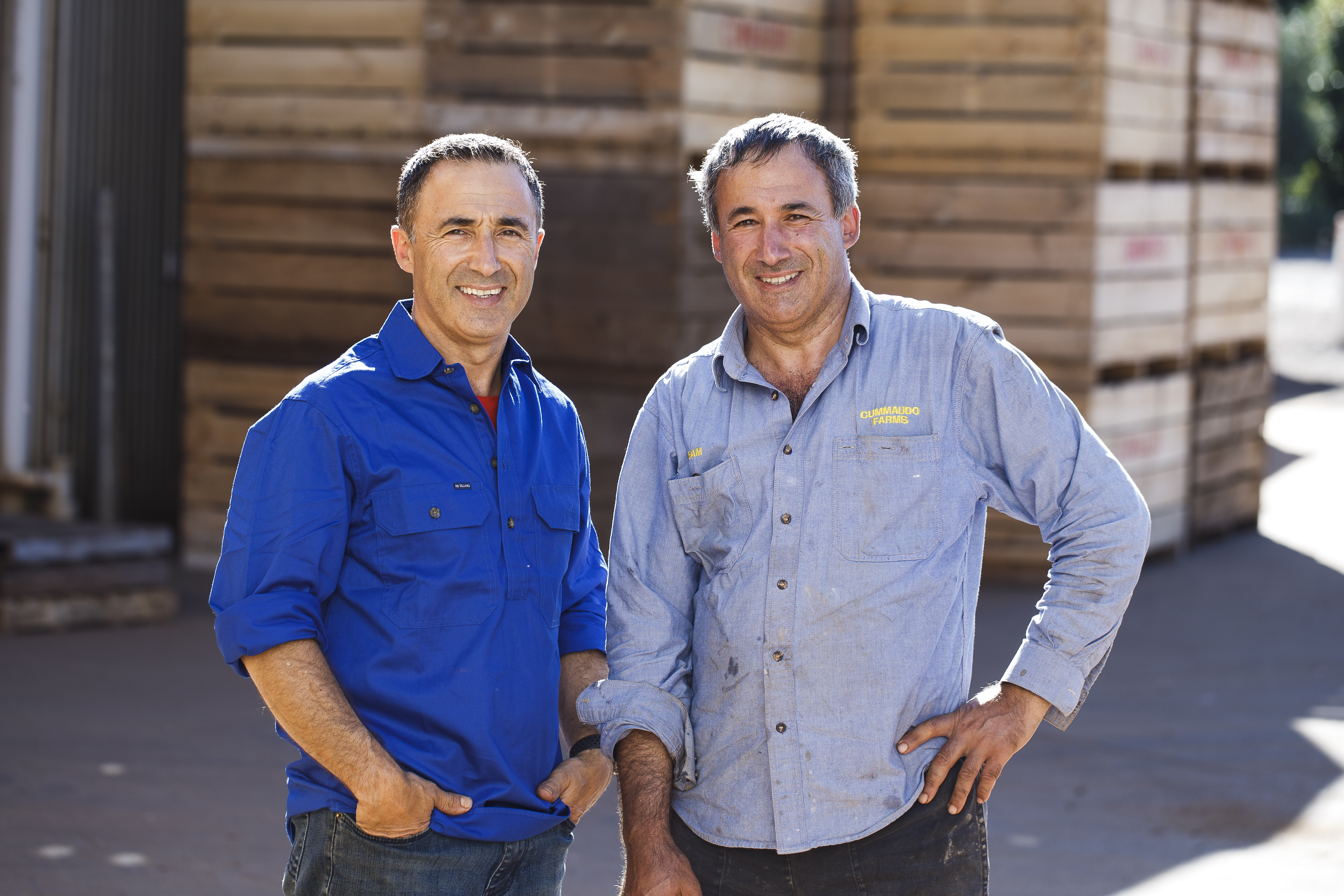Tony and Sam Cummaudo: Family business at the forefront of industry innovation
Nestled in Gippsland’s Strzelecki Ranges, the Victorian town of Mirboo North is home to a number of leading Australian potato and vegetable growing operations, including Cummaudo Farms. AUSVEG spoke to second-generation potato grower Tony Cummaudo about the flourishing family business, and the growing practices he has implemented to ensure it remains sustainable into the future.
Fast facts
Name: Tony and Sam Cummaudo
Location: Mirboo North, VIC
Works: Cummaudo Farms
Grows: Potatoes
Innovation and embracing cutting-edge growing practices are always at the forefront of potato grower Tony Cummaudo’s mind.
It has to be – Cummaudo Farms is a 1,600 acre growing operation located at Mirboo North in Victoria’s Gippsland region, and the business supplies wholesale potatoes to Coles and independent supermarkets around Australia. To keep up with supply and demand of consumers, Tony and his employees must ensure that quality standards are met so the business remains sustainable for years to come.
Cummaudo Farms was established by Tony’s father, Tom, almost 60 years ago. These days, Tom has taken a step back in the running of the business and it is now being overseen by Tony and his brother Sam. They employ nine full-time and 17 part-time employees off-season, with an additional 50 casual employees joining the team during peak times.
Tony’s role is predominantly focused on the agronomy and administration side of the business, while Sam is involved in the quality, packing sector, harvesting and transport of the final product. The brothers meet every day and compare notes on the priorities for the day ahead.
Additionally, the third-generation has shifted onto the farm. Sam’s children are currently following in their family’s footsteps, and it is hoped that some of Tony’s five children will do the same as they grow older.


Grower challenges
There are many issues facing potato growers, however Tony believes the main priority should be keeping consumers eating fresh potatoes.
“That’s our number one goal. We don’t want to see the decline in potatoes, we want people to still be eating them. Getting the fresh sector in the potato industry to work as a group to promote potatoes is a challenge,” he says.
“I think something needs to happen – from our point of view, we need to market the potatoes on our own level but really we simply need to promote the benefits of potatoes. The hard calls are I think in the industry itself – there’s washed versus brushed; we have the fresh sector versus processing and the seed sector so it’s probably hard to come to an agreement on how we should promote potatoes.
“Everyone’s got their own agenda I suppose when it comes to promotion – people say we’ll just promote our own products and others will say to work as a group, but I think it does need another layer, or a lot more presence.”
Tony says that other challenges include the cost of production and finding ways to keep that as minimal as possible; sourcing experienced staff; and implementing the best farming practices for the environment.
“I want to leave the business and the industry in a better place than when I arrived."
Environment in focus
Tony stresses the importance of working with agronomists to assist with growing efficiencies, including the effective selection and application of crop protection products.
“Just having someone in the industry who lives and breathes potatoes and is helping your efficiencies is a tremendous source,” he says.
In an attempt to understand the lifecycle of insects and how crops react to various crop protection products, Cummaudo Farms has worked with Dr Paul Horne and Angelica Cameron from IPM Technologies in recent years. Using an Integrated Pest Management (IPM) approach has proved extremely beneficial, as Tony explains.
“Looking at the way some of the chemicals work when applied to your crop, they might be not appropriate. Some do more damage than good, so the timing of application and the collection of beneficial insects to use if and when needed was probably the most important thing we got out of it.
“We have to be open to new ideas. We can’t just say ‘this is the way we grow potatoes’ for the rest of our lives. We need to be thinking.”
There are other innovations in environmental practices being implemented on Cummaudo Farms in 2018, including a weather station.
“We want to start trying to forecast outbreaks of blight. So we’re getting the best bang for our buck on applying fungicides. If we can predict a high risk of late blight or early blight before we see it on the plants we can apply the appropriate fungicides, as opposed to when we think we should put them on,” Tony says.
“We also do soil testing of every hectare and look at variation in paddocks. Some areas in the paddocks may be low on nutrients and others might be high, so that helps in applying fertiliser.”

Ongoing sustainability
Planting certified seed assists with maintaining on-farm disease resistance. The business also uses mini-tubers grown by ViCSPA and conducts trial work with new varieties.
“It’s certainly relevant to the business. Mini-tubers help us to get a first-hand look at new varieties before they are available to the public, or to other people, just to see how they grow on your property,” Tony says.
“It’s a huge benefit for seed and disease resistance, and yield and taste – you can have a high yielding potato but if it doesn’t taste any good, it’s no good. With production, obviously we’re trying to source varieties which are high yielding but I guess we still don’t want to compromise quality when it comes to yield. Quality is foremost then we look at yield.”
Cummaudo Farms is also certified by the Safe Quality Foods Institute, which means that it participates in a globally-recognised food safety management system.
“It’s a standard we need to have; you need to be making sure everyone is doing the right job in the line and continuously improving,” Tony says.
Looking ahead
Tony and his family have plenty to be proud of as potato growers, including being successful in a tough environment over the past five decades.
“I’ve had to ride out the tough times. We’ve done the hard yards. My father’s definitely gone through harder times than ourselves but we’ve still had our own fair share of them,” Tony says.
“I enjoy the satisfaction that we get from supplying fresh produce around the country, and we’re still doing it.”
The second-generation grower has two simple wishes for the future of the business: to see increased potato production and for the third generation to continue the family legacy.
“My children have potentially shown interest. I have five children so I guess if I could get one or two into the business, that’d be great.”
This grower profile first appeared in the leading magazine for the Australian potato industry, Potatoes Australia. If you’d like to subscribe to receive a new edition of Potatoes Australia in your mailbox every two months, use our online subscription form!
Photography credit: Danae Commercial

